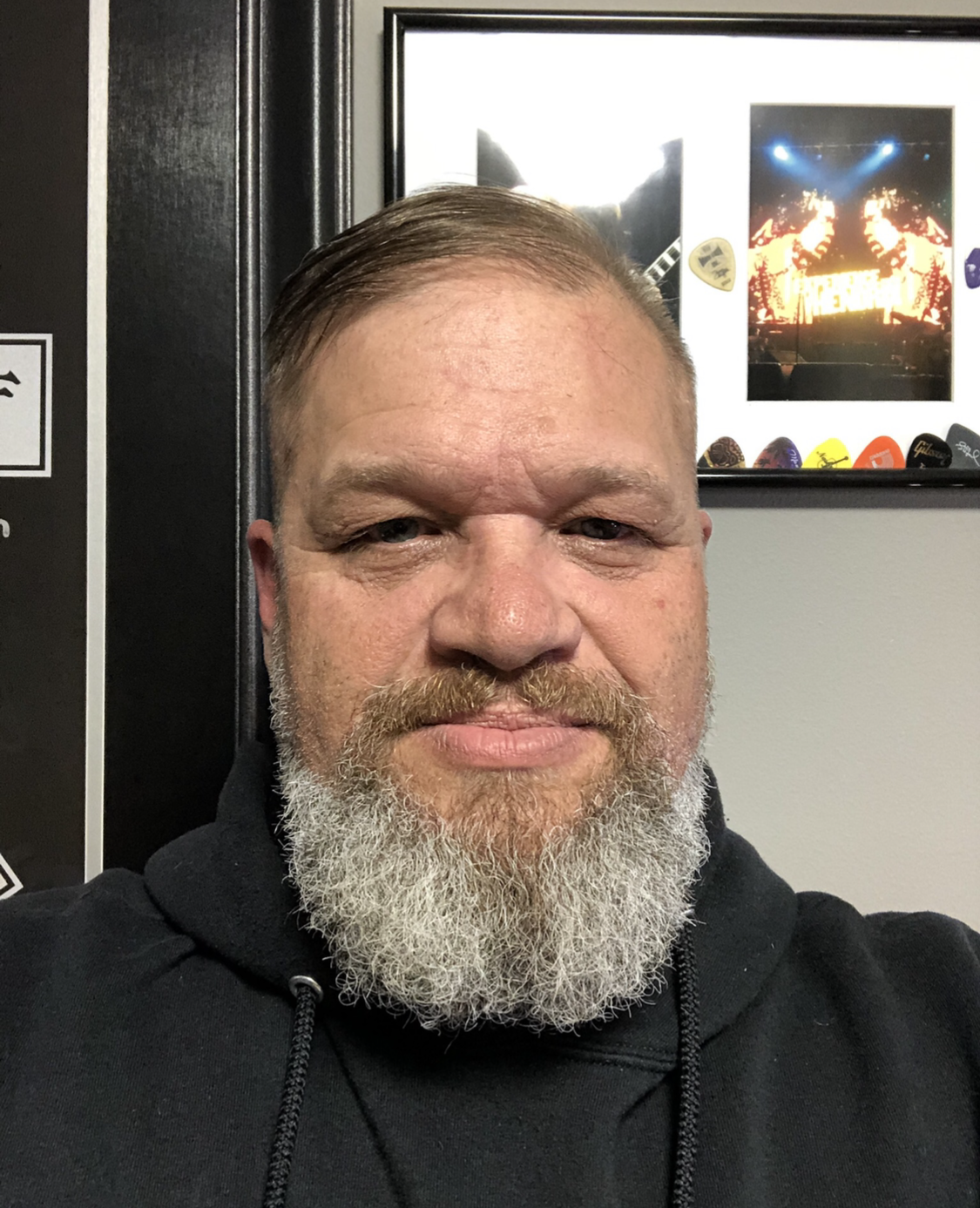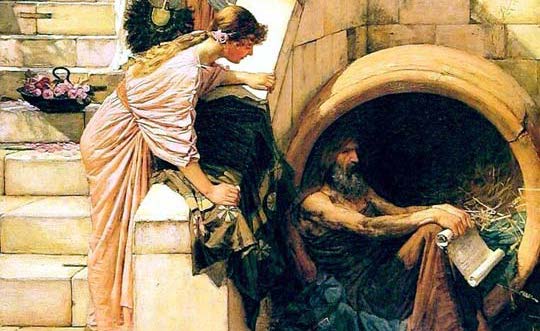Bracy Sams: A Purpose-Driven Life

Bracy Sams is the first person many new clients see when they arrive here to CORE. He is our men’s intake specialist in Branson. He also manages Hawk House, a residence for new clients. Bracy has been with us for more than seven years.
He originally hails from rural Arkansas, Carroll County to be exact, but you’d never know it looking at him. Judging by his appearance, Bracy looks like he should be on the back of a Harley Davidson, or even standing watch on a 19th century sailing frigate. He has a kind, polite disposition and a quiet strength about him. He’s the kind of man who lets you have your say before he tells you what you need to hear. Bracy clearly is passionate about recovery, too. Letting weary and hurting people know there’s a “way out” is among the best parts of his job:
It’s hearing the hope in parents’ voices when I call and tell them, yes, he’s accepted. And talking to him, who’s so broken that he’s crying, and to let him know that, hey, there’s a way out. Just get here. I’ll prove it to you. It’s being part of getting people out of the dark, out of the misery.
We met Bracy in CORE’s church sanctuary. It’s really a giant multipurpose room, and on the day of our interview all the lights are off. The room appears dark and cavernous except for a single overhead light illuminating our spot. Talking about his past couldn’t have been easy, but Bracy knows the drill. Reliving the hell of addiction is the sacrifice we make when giving testimony. Our hope is that someone listening will connect, see that there is a path forward, and ultimately find recovery through a personal relationship with God.
With the simplest of prompts, Bracy begins his story, taking us back to a time when Ronald Reagan was president, the space shuttle Columbia already made its first flight, and Indiana Jones had become a household name:
I was twelve. I got to that age where my parents let me stay overnight with friends. One friend had two older brothers who were drinking and having fun, smoking weed. The first time was when his brother had passed out in his room. We snuck in there and took his bottle and his weed. We went out to a tree house and laughed and carried on. We did that a couple of times until the third weekend. I asked his brother for it because now I really wanted it. He said, no, but I’ll sell you some. That’s how it all started.
At the tender age of twelve, young Bracy Sams already was hooked. He’d buy bags of marijuana and bring them home to his parent’s farm to find a secluded place. By the time he was in high school Bracy was a regular user. Even getting caught at school didn’t phase him. “I just started being smarter, more careful,” he explains. Once he began driving himself to school, Bracy was getting high every day, and the worst was yet to come.
In the year that he graduated from high school, Bracy tried methamphetamines for the first time. “That was a game changer,” he remembers, “that’s all I wanted to do.” Bracy’s ambition became having fun. He says, “It stopped me from being responsible and growing up. I was always running around and getting high. Girls. Parties. That was my only goal in life, for several years.”
Other things happened too. By the age of 25, Bracy married and had children. He went into the trucking business with his father. Normal pursuits did not captivate him, however. Nothing could compete with his drug life. It was only a matter of time before things would unravel. As much as one might try, no addict can keep his problem a secret forever. He says:
She [i.e., his wife] certainly knew what I was doing. It finally came to a head, and one day she left. My dad came to me and said, are you going to go apologize to her? Leave the dope alone? Leave the women alone? Now, I never admitted anything; I always denied it. I said, so you’re taking her side? When he said, yes, I was like, I’m done.
Bracy’s slide into the abyss hastened. He abandoned his business pursuits and filed for bankruptcy. His wife of seven years “filed for a divorce, and it was over, just like that.” Bitterness set into Bracy’s heart. His thinking was that, if everybody thought he was doing dope, then he’d show them doing dope Without home, wife and children, and his share in the family business, Bracy’s ship was unmoored without a rudder. He walked headlong into the seedy world of methamphetamines. He both manufactured and sold:
I almost got higher making it than using it. It gave me power. Of the devil for sure. I was blind, thinking that I controlled it, and controlled other people, when it was controlling me. It’s a deceiver, meth. It’s not knocking you down like heroin, but it still takes everything from you.
At various points during his drug career, Bracy did consider quitting, but he was firmly locked into the cycle of addiction. He held only fanciful notions of just quitting and never doing drugs again:
I’d be locked up in the county jail, and I always thought, man, this is exactly what I need, to be away from it, and I’m not going to use again. I knew without a doubt when they released me that I wasn’t getting high. Thirty minutes is as long as I ever lasted, depending on who picked me up from jail. . . .The obsession would kick in. I didn’t know what it was then – the obsession. I was looking for ease and comfort because I was so uncomfortable and hated my own skin. I hated myself.
He couldn’t keep it together. Bracy had lost nearly all contact with the people he loved the most. When he did see them, Bracy saw only disappointment in their faces or heard dismay in their voices. He remembers one year having Christmas with his children in February, saying “that’s the quickest I could make it to them.” The children would call and ask, “Hey dad, can you come to my game? Can you come to this school event? Can you come to the church thing?” Although Bracy always promised he would be there, he’d become so messed up that it didn’t happen. “Two days later, I’d be like, I’m a piece of @#$%, I forgot. How could I forget?” After awhile they stopped even calling. As for his family, Bracy hadn’t talked his siblings in over a decade. His father asked him not to come around anymore saying, “it’s too hard for your mom to even look at you.” Bracy had worn out everyone and everything around him. He reached a point where he just wanted life to be over.
Bracy actually found himself in the same place as several of us who later recovered. Like us, serendipity arrived once he was hopeless. Bracy candidly admits that he himself took no action to find CORE or apply to the program. He says, “I really don’t know how I even got here. I didn’t fill out an application or call. They called and said, hey, you’re approved to come in.” Today he speculates that maybe it was a friend of somebody letting him crash on a sofa who did the leg work. Whoever that person was, Bracy feels a debt of gratitude.
Sometimes new clients initially feel resistance to working the program. It might be pride, or unwillingness to admit they are powerless. In Bracy’s case, he was mad at God. “I was like, why would God let me be a drug addict? Why would he let me lose my family? How did he let all this stuff happen?” His attitude softened as people at CORE showed they cared. They didn’t judge him and weren’t about to write him off. Then Bracy heard about the cycle of addiction at our recovery classes. It “really grabbed hold of me, and that’s when I started paying attention in class,” he remembers. Our classes run for five weeks, at which time Bracy was ready to write his 4th Step. “When I sat down to write it,” he says, “I said, enough’s enough, and wrote it out.”
As he worked the steps, Bracy felt a weight lifting from him. He was on a life changing journey. Where once he blamed God for his addiction, he now considered his former misery as something he needed to turn toward God. “It was like God asking me, have you figured out what to do yet? Do you want to ask me?” he says. Bracy began finding contentment in not running his own show but rather in doing God’s will. A chance encounter with an addict outside the program opened Bracy’s eyes to this. The paraphernalia and drugs were “right in front of me,” he remembers, and then “God showed up.” Bracy explained to the man where he’d come from, where it had taken him, and how God had relieved him of his addiction. As the two parted ways, he also let the man know, “If you ever get tired of this, you call CORE.”
Bracy was energized by the encounter. He asked God to put people in his path who were addicts in need of help, and God obliged. It happened everywhere – at work, at the store, and on the street. Bracy began to meet suffering and hurting people, and he freely shared the solution. In time, he was made a CORE house manager, and he also began working for us. Bracy also reunited with his family. In fact, Bracy spent a fair amount of time telling us about his children and what each were doing. They see each other regularly now, anytime they want, and Bracy cherishes his time with them. He’s also made amends to his parents and siblings and enjoys seeing them, too, both here and back home in Carroll County.
Today, Bracy Sams is a man on a mission. Whether at Hawk House, or at the recovery center, he has a daily goal, “that maybe I can help convince even one person not to continue down the same road that I did, and to help them get past whatever might stop them from getting recovery.” As to why he works for CORE, Bracy pauses for a moment, looks at the light above us, and begins:
Let me tell you what CORE is about, we care about people. We love on them and introduce them to God. To get out of their miserable, self-loathing state, they have to find God. I see them when they get here and see them after. Once they buy into it, when they’re working the steps, they start having a relationship with God, and they’re two different people –
At that, his answer is interrupted by an important telephone call. It’s client related and Bracy must attend to it. The interview is over – Bracy’s back at it, what he’s all about. His work isn’t finished and, somehow, we suspect it won’t ever be. Bracy Sams is living a purpose-driven life.

